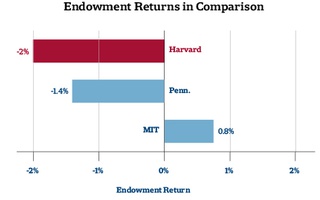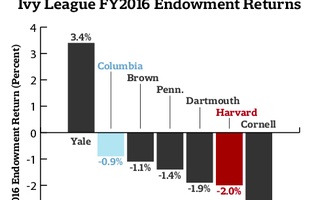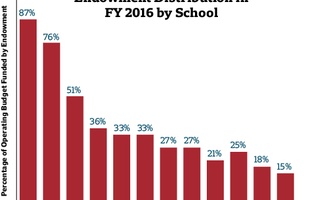{shortcode-02288537b72b8f412fb5955665b2320c91e2cf5b}UPDATED: October 4, 2017 at 5:02 p.m.
In an “unusual” step, the Harvard Corporation has voted to allow schools to take capped amounts of money out of the endowment for the next three fiscal years in an effort to insulate budgets from fluctuations in Harvard’s investment returns.
In an interview last Wednesday, University President Drew G. Faust said the Corporation set a 2.5 percent distribution increase rate for Harvard’s schools, though that number can increase in subsequent years all the way up to 4.5 percent.
Money from the endowment—now valued at $37.1 billion—funds more than a third of Harvard’s annual operating budget. Because Harvard’s operating costs steadily increases every year, a product of inflation and other factors, the University relies on larger payouts from the endowment every year. But in recent years, Harvard’s endowment has underperformed, imperiling the University’s ability to pay its ever-increasing bills.
With the change in policy, though, the Corporation has signaled that— barring unforseen circumstances—Harvard’s 12 schools can expect at least a 2.5 percent increase in the amount of money it gets from the endowment for the next three years.
“Essentially, it holds the University budgets harmless. It’s going to distribute from the endowment as if the endowment returns were significantly higher,” Faust said in the interview.
For fiscal year 2017, the firm returned a “disappointing” 8.1 percent, which its CEO N.P. Narvekar said was a symptom of “deep structural problems at HMC.”
Narvekar has embarked on an ambitious restructuring of the way the firm invests in an attempt to revitalize its investment performance, though he’s repeatedly cautioned the results of his undertaking likely won’t materialize for another few years.
In the interim, the Corporation has set a “collar” for the endowment’s annual distribution. The lowest distribution increase it might set is 2.5 percent, while the highest it would consider is 4.5 percent.
Faust said the unprecedented move was motivated by concern that disappointing endowment returns might continue to “cripple” Harvard’s programs. After Harvard returned negative 2 percent in fiscal year 2016, Faust warned that budgets would be “constrained” for years to come.
The Faculty of Arts and Sciences and graduate students each received modest pay bumps for the year that were outpaced by the rate of inflation, and the Graduate School of Arts and Sciences cut its admissions rate by 4.4 percent.
Without the new policy, Faust warned in the interview that there would have been a 1 percent increase in the amount of money distributed to school budgets in fiscal year 2019.
“That is of course very difficult because people get raises and inflation happens, and there are other costs that inevitably increase,” Faust said. With the new policy, Deans should not have to “take money out of unrestricted funds or other things in order to compensate for a flat distribution.”
The policy has dangers, though. If capital markets go belly-up and the endowment’s value plunges, as it did during the 2008 financial crash, Harvard’s schools will be drawing from a depleted endowment.
Faust said in the interview that the policy was also designed to lay a solid financial foundation for her successor—yet unchosen—who will take over as President of the University this summer.
“I think we also felt that the first year of a new president’s regime should not be one of extreme constraint,” she said.
—Staff writer Brandon J. Dixon can be reached at brandon.dixon@thecrimson.com. Follow him on Twitter @BrandonJoDixon.
Recommended Articles
-
 Harvard Loses Almost $2 Billion in Endowment Value
Harvard Loses Almost $2 Billion in Endowment Value -
Yale Earns 3.4 Percent On Investments, Beating HarvardIn a rough year for university endowments, Yale returned 3.4 percent on its investments in fiscal year 2016, beating out Harvard’s negative 2 percent returns over the same time period.
-
 Columbia Returns -0.9 Percent with Narvekar, Next HMC Head
Columbia Returns -0.9 Percent with Narvekar, Next HMC Head -
Harvard’s Endowment Returns Trails National Average, Report SaysHarvard’s endowment grew slower than was average for university endowments in fiscal year 2016, according to a recent report from the National Association of College and Business Officers.
-
 Schools Will be 'Differentially' Affected by Endowment Returns, Faust Says
Schools Will be 'Differentially' Affected by Endowment Returns, Faust Says













